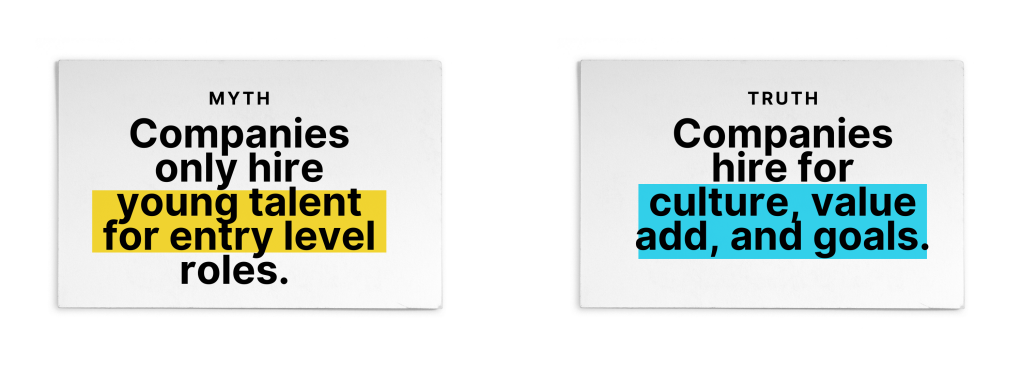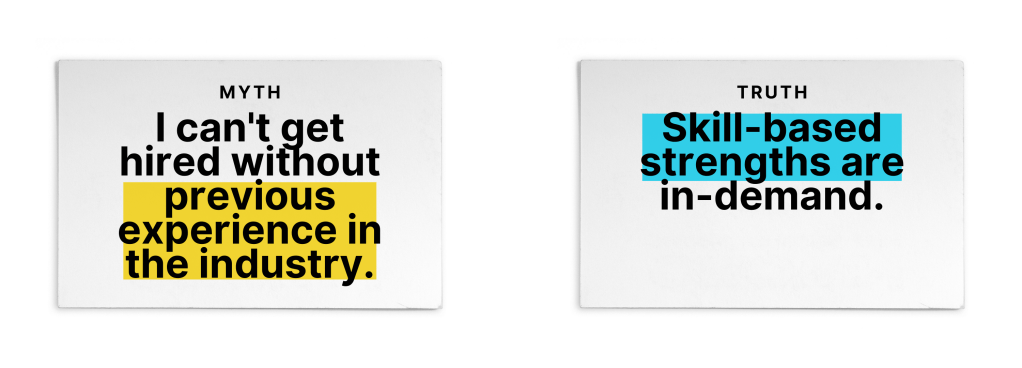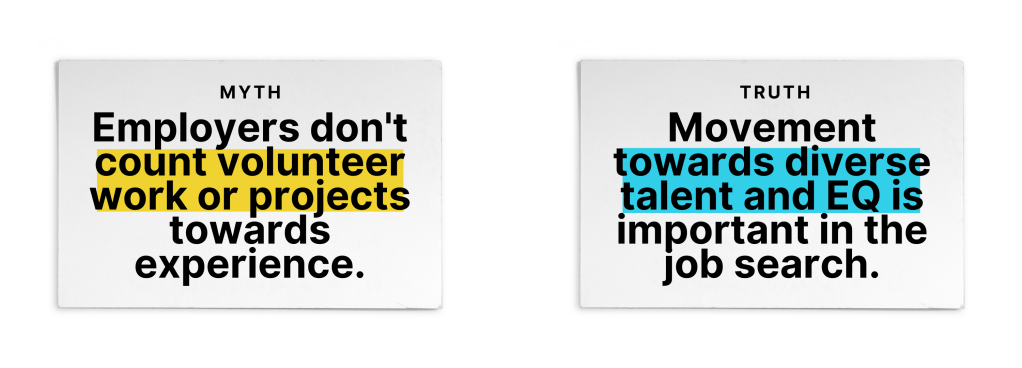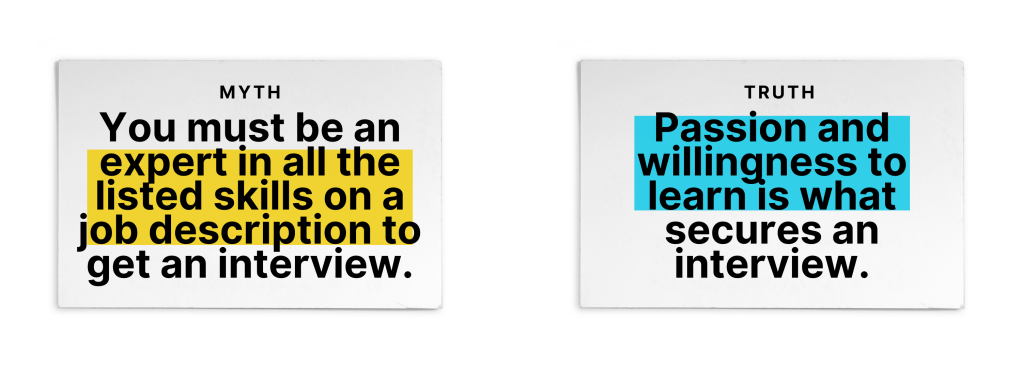2U, Inc. is the parent company of edX.
Let’s talk about honesty. The foundation of any good job search is built through it, after all.
In a job search, honesty is a two-way street: on one hand, employers are expected to be clear about job descriptions and expectations, while on the other hand, candidates are expected to be up-front about their experiences, abilities, and willingness to learn.
As a job seeker, there are two ways to be honest in your search that reign supreme among other strategies: knowing yourself and knowing the truth.

As discussed in “Steps for Success in the Proactive Job Search,” there are quite a few measures candidates can take to understand themselves, their skills, their interests, and needs. Now, 2U, Inc. career expert, Caroline Yacoe, wants to help job seekers know the truth.
In her recent workshop, Can You Handle the Truth? Debunking Job Search Myths, Yacoe tapped into the concerns and fears of attendees, and disproved common job search myths, which we will delineate below.
To find more resources, events, and workshops, visit the Career Engagement Network.

The fear that ageism has an affect on hiring decisions is common. “It’s very typical to have these thoughts around age,” Yacoe says. Although it is necessary to acknowledge the existence of bias in the job search space, we warn against letting age-discrimination dictate your career decisions.
Companies hire for culture add and goals. By hiring candidates from different age demographics, companies welcome a diversity of skill sets, experiences, and passions. Entering a new job with prior experience means that you have navigated situations and learned lessons, unique to you, to guide you in your role – which is always a plus.
If you are mid-career and looking to make a switch, trust us when we say that you are not alone. The reality of the modern workforce is this: having a singular career is falling out of favor and giving way to multiple careers. Indeed conducted a pre pandemic survey of 662 full-time U.S. workers, and they found that nearly half of them have made a big career shift. What’s more, CNBC reports that the average age of a career switcher is 39-years-old.
As the unemployment rate steadily declines and industries shift, there is no better time for job-seekers of every age to reevaluate and chase after their career goals. Regardless of age, one hard reality for job-seekers is the time it takes to make a career change. Indeed reports that, on average, the time it takes to consider a career change is 11-months. “A lot of people are thinking about this for a long time before they actually do make the leap, so it can feel like an extremely long process,” Yacoe adds.
Bill Anderson, a UX Designer for The Home Depot, is no stranger to this process. After being laid off from an IT job, Anderson had an opportunity to start fresh in a new field. One epiphany, a few months of deliberation, and one in-depth user experience class later, he did just that. Watch here:
As career shifting becomes more typical, things are looking up for older workers. According to the Bureau of Labor Statistics, by 2024, one-quarter of our workforce is expected to be 55 and older.
In the meantime, as a job-seeker, there are many ways you can work to counteract age-bias in your search. Yacoe recommends a few steps from the proactive job search process: networking, researching, and tailoring application materials. By making connections at companies you have an interest in, you are pushing back on any blind biases that may exist, and proving your worth.

“When people talk about having trouble hiring, it’s really based on transferable skills, the soft-skills, more-so than anything technical,” Yacoe says. Truth be told, employers are often less interested in where you developed interpersonal, technical, or transferable skills, and more interested to see that you do, in fact, have them.
Our data speaks for itself: When polled, 52% of 2U, Inc.’s 6000 unique employer partners said they are open to hiring candidates with less than one year of industry-specific experience.
Kirsten Paluch, an IT Manager at Louisiana-Pacific Corporation, urges candidates to take another look at their experience. Watch here:
For field-switchers, an important thing to keep in mind is that technical and industry-specific skills can be learned, whereas soft skills are more intuitive.
Often indicative of our abilities to problem solve, work with others, and react to situations, soft skills involve our personality and behavioral traits. According to an Indeed survey of hiring managers, the most desired attributes of top employees include effective communication, self direction, and adaptability, which are all soft skills. Showcasing these qualities can make all the difference in your job search.
Want to prove that your out-of-field experience is transferable? The way you market yourself as a candidate is extremely important, Yacoe says. Be diligent in crafting and practicing your career narrative. If possible, work with a career mentor to appropriately highlight non-traditional experiences like freelancing and volunteer work – yes, volunteer work!

One aspect of the job search that often goes overlooked, is an employer’s desire to hire candidates with emotional intelligence (EQ). Daniel Goleman, Ph.D., author of the Harvard Business Review article “What Makes a Leader,” agrees. “It’s not that IQ and technical skills are irrelevant. They do matter, but they are the entry-level requirements for executive positions.”
The statistics certainly favor EQ, as well. A study done by Dr. Travis Bradberry, author of the bestselling book: Emotional Intelligence 2.0, shows that those with a higher EQ tend to make a greater average salary by $29,000.
Showcasing volunteer work and passion-projects illustrates your EQ to the employer, demonstrates a willingness to go above and beyond, and highlights some of those transferable skills, mentioned earlier. “It really exemplifies, in so many different dimensions, how you are going to be a great employee,” Yacoe adds.
Volunteer experiences and passions are among many things that set you apart from other job-seekers. And for the cherry on top: Yacoe says that you are 82% more likely to get chosen by hiring managers for volunteer experience.

It goes without saying, but we’ll say it anyway, that one of the most intimidating parts of a job search is the job description itself. Yacoe refers to the job description as a wish list of sorts. “The reality of them [the employer] finding someone that has absolutely all of the listed qualifications is really slim,” she adds.
The magic number for meeting a job description is 60%. Meaning, if you fulfill three out of five requirements, you should apply.
Applicants should still maintain the idea that quality is better than quantity in the search. Rather than applying in troves, have more confidence in applying to positions that you are truly interested in – but don’t meet all of the qualifications for.
Using 60% as your metric, and realism about the listed qualifications as your guide, Yacoe encourages candidates to face job descriptions without fear. “It is all about thinking, maybe I haven’t done this exact thing, but what I have done is similar or, I don’t know about this one area, but I’ve had to teach myself some other really hard and complicated concepts.”
Launa Rich, Managing Director of Staffing at Cyber SN, seconds this notion. Rich attributes a fundamental problem with the job search process to its online existence, as job descriptions have been “blown out of proportion.” Watch here:
Rich’s claim that women are more likely to shy away from jobs when they do not fulfill 100% of the qualifications, stems from an internal report by Hewlett Packard (HP). HP has not been the only company to do research on this phenomenon, referred to as the “confidence gap.” According to survey data by LinkedIn, women apply to 20% fewer jobs than men.
Gender aside, there are many different ways to bridge qualification gaps. First, remember that it is okay to not match all of the listed requirements. Research target companies and their missions. Consider your own unique skill set and goals, and how they can further contribute to a company’s purpose. Update your career materials as necessary to prove your qualifications. And lastly, utilize research and Youtube to brush up on imperative topics.
All in all, there is no harm in applying.
Still interested?
Watch a previous Debunking Job Search Myths session here.
Additional Resources







